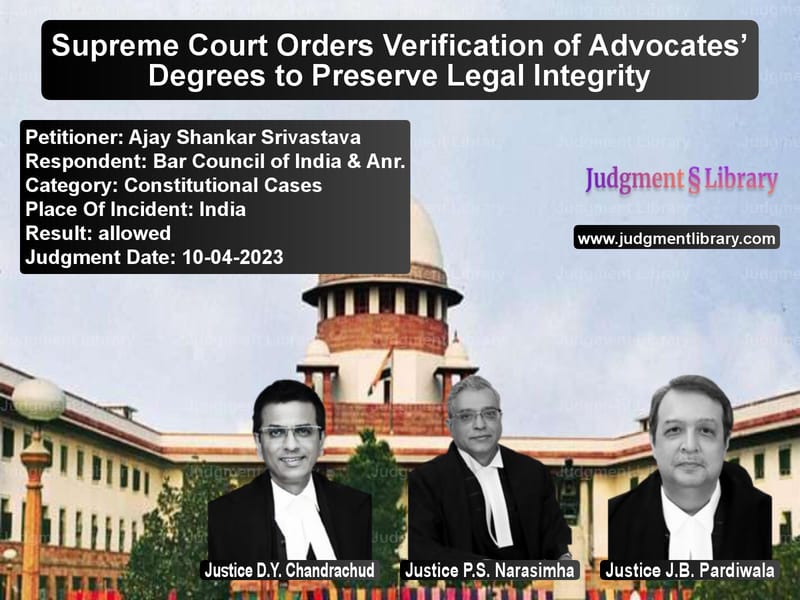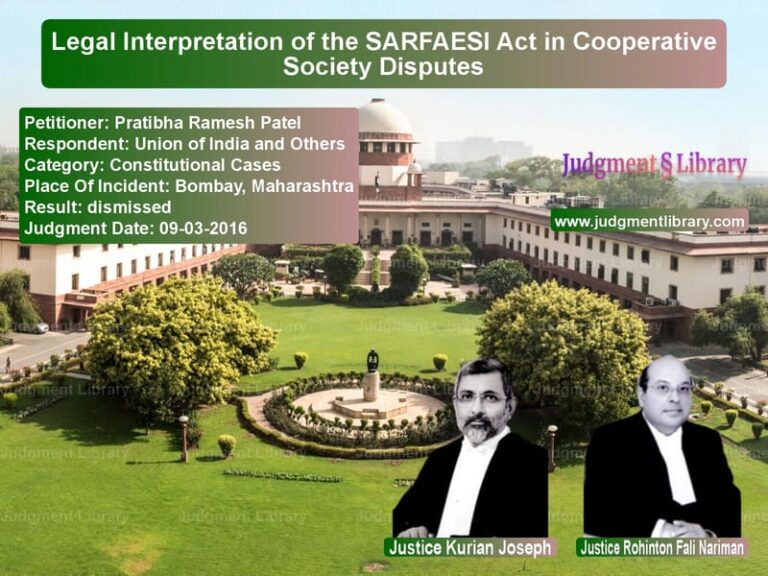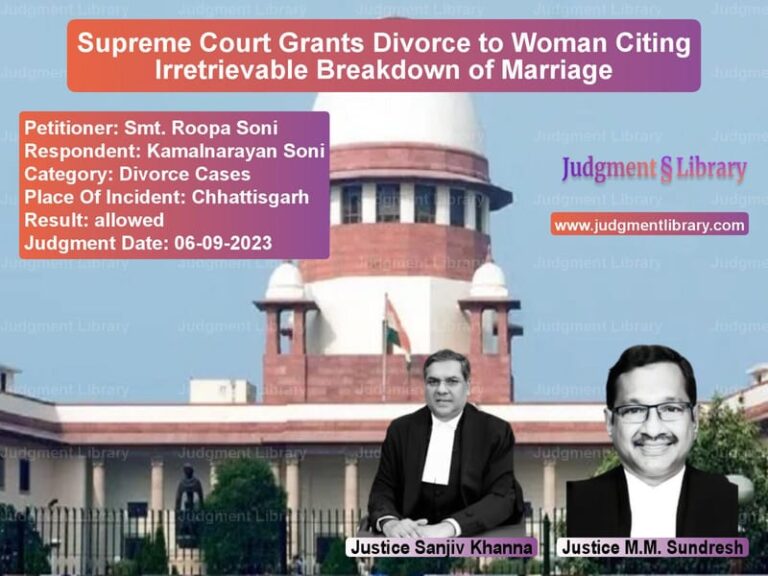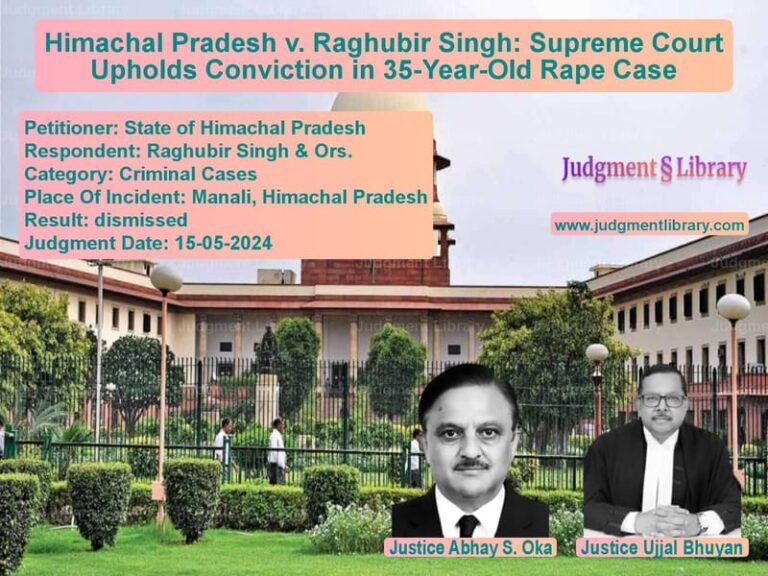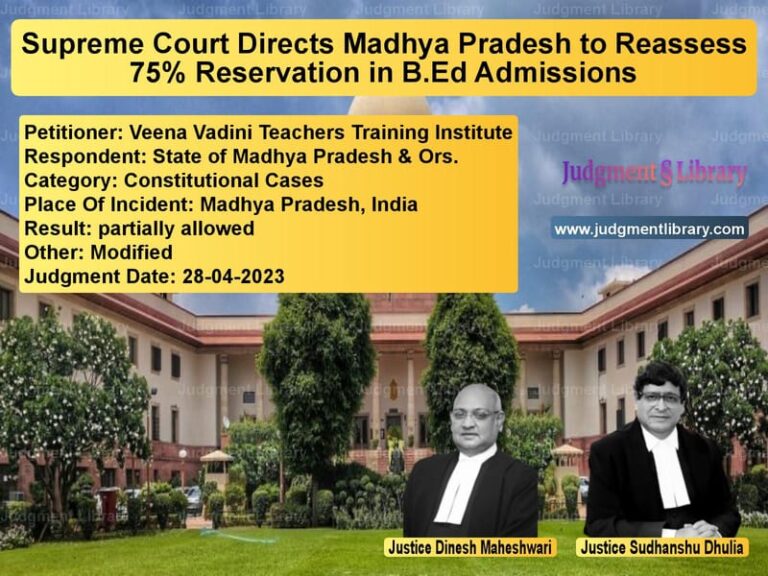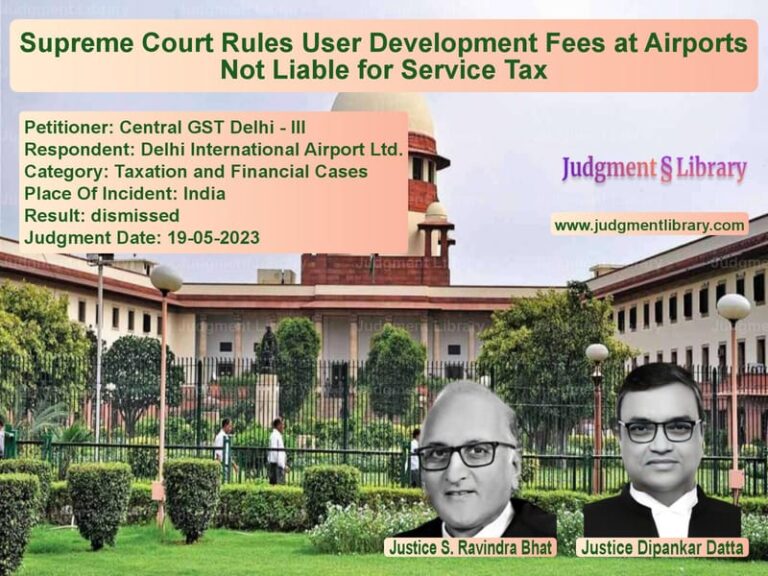Supreme Court Orders Verification of Advocates’ Degrees to Preserve Legal Integrity
The Supreme Court of India, in the case of Ajay Shankar Srivastava vs. Bar Council of India & Anr., addressed concerns regarding the verification of advocates’ educational degrees and the enrollment process with State Bar Councils. The case raised significant issues related to legal practice integrity, including the presence of individuals with fake degrees practicing law.
The Supreme Court, while acknowledging the importance of verification, directed the formation of a High Powered Committee to oversee the process. The ruling emphasized the duty of all genuine advocates to cooperate in the verification process to protect the credibility of the legal profession.
Background of the Case
The petitioner, Ajay Shankar Srivastava, a practicing advocate, filed a writ petition raising two main concerns:
- Challenging the office order dated November 1, 2022, issued by the Bar Council of India (BCI) to all State Bar Councils. The petitioner claimed that this order halted the verification process of enrolled advocates.
- Questioning the method used by State Bar Councils to co-opt members to fill casual vacancies.
The Supreme Court focused primarily on the verification of advocates, highlighting the risks posed by individuals practicing law with fake degrees.
Key Issues Addressed
1. Verification of Advocates’ Enrollment and Degrees
In 2015, the Bar Council of India introduced the Bar Council of India Certificate and Place of Practice (Verification) Rules, 2015 to verify the authenticity of lawyers’ degrees and ensure they are legally entitled to practice law.
Read also: https://judgmentlibrary.com/supreme-court-upholds-mandatory-e-filing-in-debt-recovery-tribunals/
Challenges to these rules led to multiple cases in different High Courts, prompting the BCI to file a transfer petition, consolidating all cases before the Supreme Court.
Despite the Court’s involvement, verification faced hurdles, including:
- Demands from universities for fees to verify degrees.
- Delays due to a massive number of enrolled advocates—rising from 16 lakh to 25.70 lakh.
- Failure of many advocates to submit verification forms.
BCI’s records showed that out of 20.57 lakh advocates, only 7.55 lakh had submitted verification forms, with an additional 1.99 lakh senior advocates and advocates-on-record providing declarations. This left a large number of unverified individuals in the legal profession.
2. Presence of Fake Advocates
The BCI raised concerns that many individuals who failed to submit verification forms might be holding fake law degrees. Such individuals were known to disrupt legal proceedings and diminish the credibility of the legal system.
The Supreme Court acknowledged the seriousness of the issue and emphasized:
“The due verification of advocates who are enrolled with the State Bar Councils is of utmost importance to preserve the integrity of the administration of justice.”
The Court warned that if the verification process was not carried out regularly, the legal profession could be undermined.
Arguments Presented
Petitioner (Ajay Shankar Srivastava) Arguments
- The BCI’s office order dated November 1, 2022, disrupted the verification process, creating uncertainty.
- State Bar Councils must ensure transparency in filling vacant positions.
- The verification of lawyers’ degrees should be conducted without unnecessary restrictions.
Respondent (Bar Council of India) Arguments
- The verification process must include the checking of degree authenticity and not just rely on certificates issued by State Bar Councils.
- The delay in verification was due to logistical challenges and resistance from some lawyers.
- The BCI had no intention of stopping the process but wanted to ensure it was conducted correctly.
Supreme Court’s Observations
The Supreme Court, led by Chief Justice D.Y. Chandrachud and Justices P.S. Narasimha and J.B. Pardiwala, made the following key observations:
- Verification is crucial to prevent individuals with fake law degrees from entering the profession.
- Advocates who fail to submit verification forms may be unqualified and pose a serious risk to justice.
- The BCI’s intent was not to halt verification but to ensure proper validation of degree certificates.
Final Judgment
The Supreme Court issued the following directives:
- A High Powered Committee was constituted to monitor the verification process.
- The committee would be chaired by Justice Deepak Gupta, a former Supreme Court judge.
- The committee members included former High Court judges, senior advocates, and three BCI members.
- The committee would issue guidelines to ensure smooth verification of degree certificates.
- All universities and examination boards were directed to verify degrees without charging a fee.
- State Bar Councils must comply with committee directives and submit compliance reports.
- A status report must be submitted by August 31, 2023.
Implications of the Judgment
This ruling has major implications for the legal profession:
- Ensuring Professional Integrity: Only qualified individuals will be allowed to practice law.
- Standardized Verification: A uniform process across all State Bar Councils.
- Eliminating Fake Lawyers: Strengthens the credibility of the legal system.
- Protection for Genuine Lawyers: Ensures that legitimate advocates do not face unfair competition.
Conclusion
The Supreme Court’s ruling in Ajay Shankar Srivastava vs. Bar Council of India is a landmark decision aimed at strengthening the legal profession’s integrity. By ensuring that all advocates undergo strict verification, the Court has taken a significant step in safeguarding the justice system from unqualified individuals.
The creation of a High Powered Committee, along with mandatory verification, will lead to a more transparent and credible legal profession. With strict monitoring and compliance, the legal fraternity can ensure that only those with legitimate qualifications practice law in India.
Petitioner Name: Ajay Shankar Srivastava.Respondent Name: Bar Council of India & Anr..Judgment By: Justice D.Y. Chandrachud, Justice P.S. Narasimha, Justice J.B. Pardiwala.Place Of Incident: India.Judgment Date: 10-04-2023.
Don’t miss out on the full details! Download the complete judgment in PDF format below and gain valuable insights instantly!
Download Judgment: ajay-shankar-srivast-vs-bar-council-of-india-supreme-court-of-india-judgment-dated-10-04-2023.pdf
Directly Download Judgment: Directly download this Judgment
See all petitions in Fundamental Rights
See all petitions in Public Interest Litigation
See all petitions in Judgment by Dhananjaya Y Chandrachud
See all petitions in Judgment by P.S. Narasimha
See all petitions in Judgment by J.B. Pardiwala
See all petitions in allowed
See all petitions in supreme court of India judgments April 2023
See all petitions in 2023 judgments
See all posts in Constitutional Cases Category
See all allowed petitions in Constitutional Cases Category
See all Dismissed petitions in Constitutional Cases Category
See all partially allowed petitions in Constitutional Cases Category

